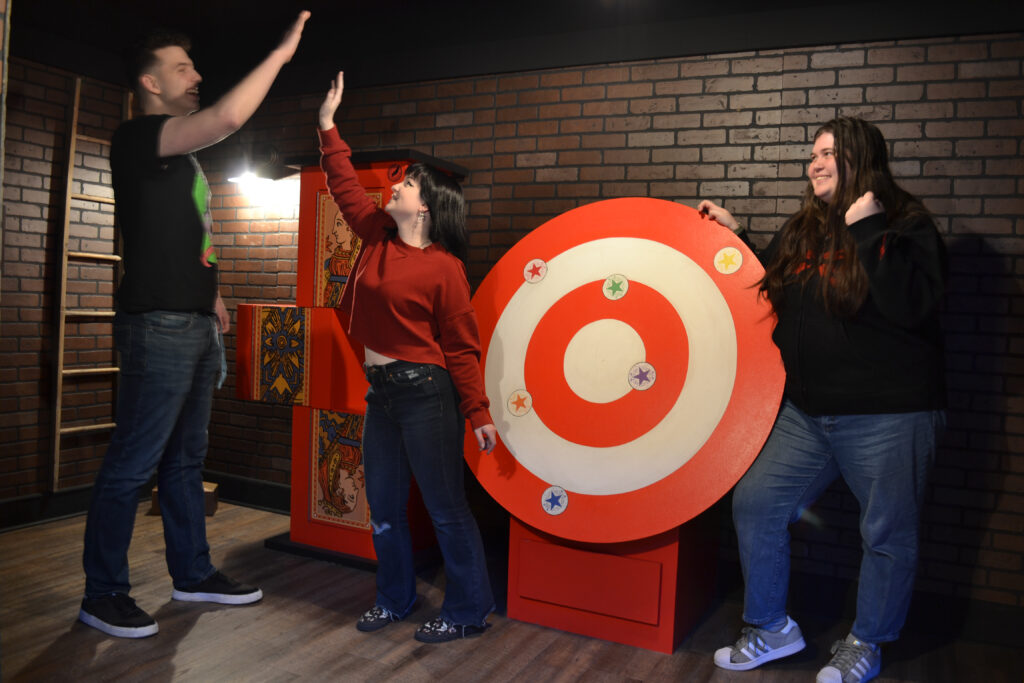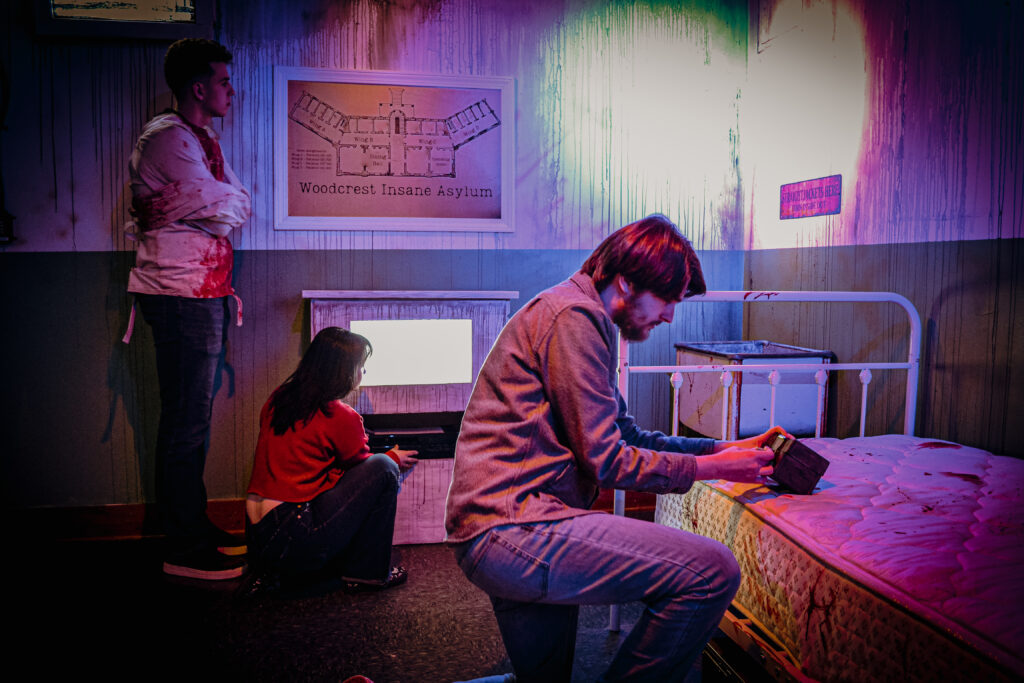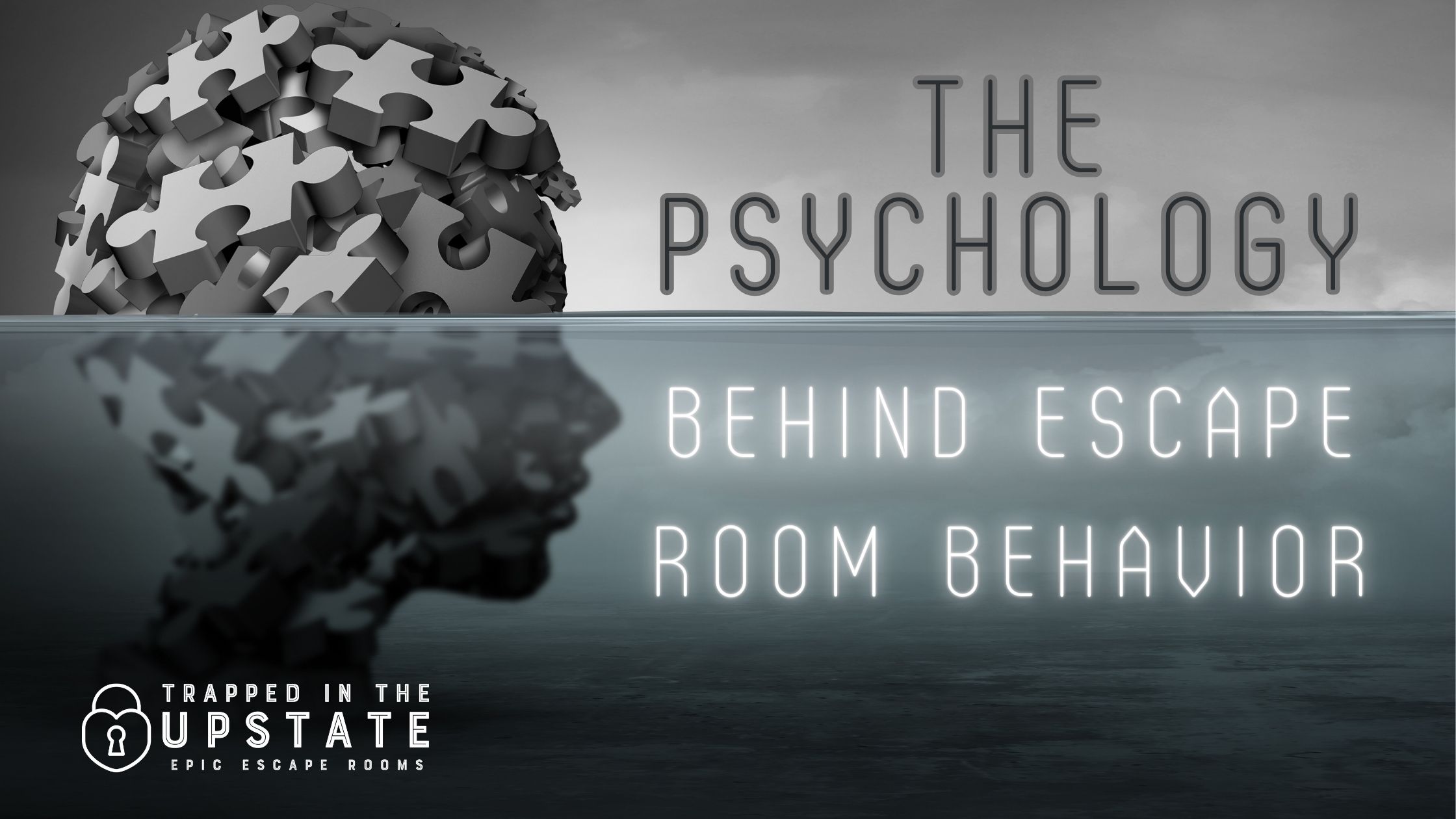Do you want to be a part of an immersive adventure experience with your family and friends? Do you want to challenge your mind while experiencing excitement and mystery?
If your answer is “Who doesn’t?” then escape rooms are the perfect activity for you. Since they came to the U.S. in 2012, escape room games have become more and more popular among friend groups, corporate team-builders, and families. There are so many applications for these games.
But have you ever wondered about the psychology behind these kinds of experiences? What makes them work? What makes them predictable? And more importantly, what can we learn from them?
Well, as your resident psychotherapist-gone-escape room owner, I’m here to de-mystify that very topic. You see, there is quite a bit that goes on underneath the surface when a group is playing an escape room game. While this list isn’t all-inclusive (because what is, really?), it does offer a little bit of insight into the gameplay, and maybe a little insight into life. 😊
When people can’t figure out what to do next, they seek more and more information to the point of confusion.

This one is my personal favorite. According to the theory of information bias, when we are trying to make a decision, we generally seek data on which to rationally base the choice. Where this goes wrong, is when we assume that ALL information is useful, and that ‘more is better’. Sometimes, extra information adds no significant value and just leads to confusion. This is especially true in the world of escape room games.
I can’t tell you the number of times players have everything they need to solve a puzzle (even multiple puzzles) but they continue to search for additional information. This is one reason we do not allow flashlights in our games. They tend to be a distraction from what the players really need. Players might hyper focus on a dust bunny in the corner (for SHAME gamemasters), thinking it’s some sort of clue. They don’t notice the big obvious sign in the middle of the room that does not require a flashlight to be seen that indicates what to do next.
When you’re not sure where to go next, revisit what you have and what you haven’t used yet…or maybe even ask for help!
People tend to work on things they feel competent to do and ignore tasks they feel are too difficult.

According to cognitive evaluation theory, when looking at task, we evaluate it in terms of how it will or will not make us feel competent and in control. If we think we can accurately complete the task, we will be more motivated to complete it, requiring no further external motivation.
We see this often in escape room players. There is a particular puzzle in one of our rooms that involves colored boards (I won’t give it way) that seems far more complicated than it is. At the point in which these boards are discovered, it is very apparent that the players have all the required parts for the next clue, yet it seems to take them forever to start working on the puzzle.
A common test taking technique is to skip questions that require more complication and come back to them later, so your brain doesn’t get so scrambled that it errs on easier questions. In linear escape rooms this is impossible to do. To progress in the game, you must solve one puzzle before you are physically able to do the next.
The best way around this is to have someone with that skill set work on that particular puzzle. If you don’t have a player with that forte in your team, just remember that most puzzles are based on logic and try the simplest answer first.
Players want to feel like they are progressing through the game.

Endowed progress effect posits that when people feel they have made some progress towards a goal, they will become more likely to continue working towards achieving the goal. To clarify, they don’t have to make progress. They just must believe they are making progress. The corollary is that people who feel they are not making progress will be more likely to abandon efforts.
This effect is painfully obvious when players are working through their escape room. There comes a point in time where all the players are standing still and just staring at each other or around the room in silence. Sometimes, if there’s a chair in the room, they will simply sit down. It’s clear to see that people are giving up. They feel hopeless and lost.
Then the glorious sound of the gamemaster hint comes across the screen, gives a clue, and everyone is back up and moving again. The easiest way to avoid the Endowed Progress Effect is to use your gamemaster. We are here to assure you don’t give up. Let us help you feel progressive again!
The minority opinion in a team can convert the majority.

I wrote an article about the type of players that can derail an escape room team, and one of those players was “Debbie Distractor”. This player comes up with some convoluted logic and completely convinces the team to stop solving the puzzle they are working on to do something totally nonsensical. This can be attributed to what is known as conversion theory, which states that the minority can have a disproportionate effect, converting many ‘majority’ members to their own cause.
Why does this happen? Usually it is because the majority members do not fully believe in what they are doing (their “cause”) or because it is just easier to go with the minority in that moment. In an escape room, no one is always sure that they are on the right track, so it is relatively easy to convince them to go in a different direction, even if it makes no rational sense.
While it’s usually a good idea to get input from all players, it’s also important not to get too distracted before the idea you are currently trying has been fully vetted. Of course, you can also ask your gamemaster if you’re on track.
People try to solve new puzzles in the same ways they solved previous ones.

There is something called the representativeness heuristic that says that we judge the probability of an event by finding a ‘comparable known’ event and assuming that the probabilities will be similar. In short, we need to classify things. If we encounter something new or different that doesn’t fit into our current knowledge, we go with the closest thing we do know. In escape rooms, this is seen when a puzzle is solved around a certain item (like a photo), and then when another puzzle including that item is encountered, players assume that they will solve it the same way as the first, even though there is no indication that will be the case.
While there is some consistency in types of escape room puzzles, a good player will approach each puzzle or task as its own separate event, rather than assuming anything from prior events, no matter how similar.
These psychological theories and phenomena are not only for escape rooms, but for how the human brain makes sense of things in general. Knowing them will not only make you a better player, but it will help you understand the world and the people around you. And when you’re ready to put your team to the test, be sure to book a room with us and see what psychological effects you notice!
We’ll be here to guide you either way.

